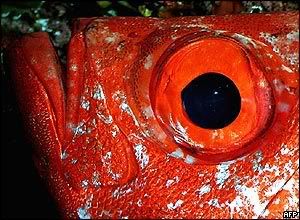Judging Your Internet Catch
 Your manuscript is hungry for information, and it’s time to go fishing for historic details, a better description of a particular item, a list of Mexican tourist attractions (whatever). Armed with your favorite search engine and some idea of what you're looking for, you sink your net deep into the Internet ocean. When it comes up, it feels good—not too heavy, not too light—and you’re ready to inspect it. But do you know how best to sort through the e-weed and old boots to uncover the best possible catch?
Your manuscript is hungry for information, and it’s time to go fishing for historic details, a better description of a particular item, a list of Mexican tourist attractions (whatever). Armed with your favorite search engine and some idea of what you're looking for, you sink your net deep into the Internet ocean. When it comes up, it feels good—not too heavy, not too light—and you’re ready to inspect it. But do you know how best to sort through the e-weed and old boots to uncover the best possible catch? Here's a start!
Refuse to be awed by the top ten hits. Advertisers pay some search engines to display their websites as first hits on web searches. This means you can't count on your search engine to sort hits for you in order of relevance, even if they claim to. Sites promoting products may be too biased to be trustworthy. Investigate other options.
But wait, there's more!
Let the URL guide you. Feel encouraged if your hit takes you to a higher-education or government site (.edu or .gov in the address or URL), as this information may prove more accurate than a .com (a commercial site). Run by an organization, a .org may provide excellent resource information, though be careful of information bias. Other possible yellow flags:
• Is there an AOL or other Internet service provider address, or a tilde (~) sign in the URL? This site could be someone’s personal website, in which case you’ll need to ask yourself if this person is an expert source. (Even .edu sites can host personal student and teacher sites. These sites may not be refereed by the university or college, so be wary.)
• Is the root domain (listed after the www) reputable? Always consider the source and ask yourself what they may have to gain by swaying you to their way of thinking. Are they selling something or clearly biased? Keep searching.
Judge a site by its cover. I don’t mean if it’s not pretty, bypass it, but you can and should judge a website by its appearance in some respects—and not just its cover, but its pages, its links, its webmaster. Peruse, absorb, then ask yourself the following:
• Is it well written?
• Is it well maintained with current links?
• Does a well-respected sponsor advertise here? (This is different from an ad-site in that a sponsor supports a site’s efforts, but doesn't usually influence content.)
• Does the site specialize in the information you’re looking for? (Note the root address and the site’s affiliations and purpose may be clear.)
• Has the site been written by someone who seems to be an unbiased expert in the area of interest? (Is he/she credentialed? Are there citations on the site?)
• Is the site itself known to be reputable?
Any one of these things may encourage trust in the information here, but a cluster of these is best.
Beware false authority. No site, no matter how wonderful, is guaranteed to be perfect; people run them, after all! Snopes.com, a terrific website dedicated to debunking the urban legends that propagate on the ‘net, is often considered by many to be a “primary source” of information—a trustworthy, take-it-to-the-bank kind of source. But some time ago they posted
 false information about the origin of the nursery rhyme, “Sing a Song of Sixpence,” stating it was a coded message used to recruit new pirates while on land. The thing is, Snopes knew the information was false when it posted it on its site, and it did it to prove a point: No site is inherently trustworthy. (Anyone investigating the more information link listed on the site’s piratic page would’ve immediately discovered the truth of the ploy.) In a shocking turn, The Learning Channel, hosting a show on urban legends, fell victim to Snopes’ trap and broadcast on national television that the rhyme was in truth a pirate code. If you let yourself become a passive participant in the research process, this same sort of thing can happen to you. Remember to read the fine print and rely heavily on logic. If something you read doesn’t gel with your common sense, pinpoint why and dig deeper.
false information about the origin of the nursery rhyme, “Sing a Song of Sixpence,” stating it was a coded message used to recruit new pirates while on land. The thing is, Snopes knew the information was false when it posted it on its site, and it did it to prove a point: No site is inherently trustworthy. (Anyone investigating the more information link listed on the site’s piratic page would’ve immediately discovered the truth of the ploy.) In a shocking turn, The Learning Channel, hosting a show on urban legends, fell victim to Snopes’ trap and broadcast on national television that the rhyme was in truth a pirate code. If you let yourself become a passive participant in the research process, this same sort of thing can happen to you. Remember to read the fine print and rely heavily on logic. If something you read doesn’t gel with your common sense, pinpoint why and dig deeper.Look for buried treasure. If you’re having a hard time finding or verifying info online, consider your people options. Where to look?
• If you belong to an industry organization, you’ll find that many have research experts you can query for help. Shoot off an email or ask through a message board.
• Another option is to ask people who love a particular topic to talk about the topic they love! There is a huge listing of usenet groups at Google HERE. Check it out!
• Search Topica to join a mailing list of people who share your interest. Not only might the members be able to refer you to a tried-and-true site or expert source, but the list itself may have an expert as one of its members.
• Check Amazon.com to see who has written a book on the topic you’re interested in, or investigate professors at universities and colleges around the country to see who specializes in what you’re researching. Very often, you can find author and professor contact information, with websites, even email addresses online. These people are usually very learned and accessible…even THRILLED to chat about one of their favorite topics!
Maybe someday, every site online will be graded and we’ll know how much trust to put into each of them. Until that day arrives, however, we have little choice than to take the ‘net as it is—a huge, ever-expanding ocean filled with great catches and a lot of crapola. Remember that the power is always yours. If you find yourself thinking, “that’s incredible,” stop yourself and say, “that’s unbelievable,” then cast another net to uncover the truth.
I just had to update my Blogger bio, otherwise you'd be saying, "Humph. Who's she to say anything about research, anyway? At least I taught you well. ;)
Write on, everyone!

 posted by Therese Walsh at
posted by Therese Walsh at 


3 Comments:
She knows of what she speaks, folks! But I'm guilty of hitting only the first few pages of Google. Bad habit.
Great advice, Therese!! You hit all the high points - the web is a great resource, but only if used with caution.
Thanks, Tess! I'm trying to teach my daughter how to use the 'net now ... scary!
Post a Comment
<< Home